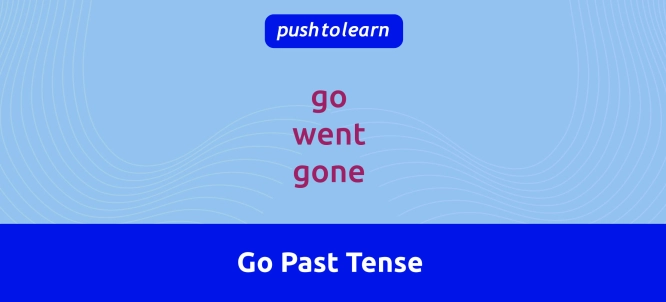by PushtoLearn
Pasado del verbo Go en inglés
Tabla de contenidos
Go – Formas en Pasado – Ejercicios
Estos ejercicios practican diferentes formas del verbo GO y otros VERBOS IRREGULARES.
Significado
El verbo "go" significa moverse de un lugar a otro, viajar o participar en una actividad.
Ejemplo:
-
"I go to the park every weekend."
-
"She goes to the library to study after school."
Cuando se refiere a acciones pasadas, "go" cambia a "went".

Formas de "Go"
|
Tiempo verbal |
Forma |
Oración de ejemplo |
|
Presente |
go |
"I go to work by train every morning." |
|
Pasado |
went |
"Yesterday, we went to the beach." |
|
Participio pasado |
gone |
"She has gone to Italy for her vacation." |
|
Participio presente |
going |
"They are going to the park right now." |
Ejemplos de "Go" en oraciones
Pasado simple (went):
"He went to the market to buy some vegetables."
"We went to the museum last weekend."
"I went to bed early because I was tired."
Participio pasado (gone):
"She has gone to the store, and she’ll be back soon."
"They had gone to the park before it started raining."
"The book is gone from the shelf—I wonder who took it."
Errores Comunes con "Go"
1. Usar "goed" en lugar de "went":
Un error común es agregar "-ed" a "go" para formar el pasado, lo cual es incorrecto.
Incorrecto: "He goed to the store yesterday."
Correcto: "He went to the store yesterday."
2. Confundir "went" con "gone":
Los estudiantes suelen confundir el pasado simple "went" con el participio pasado "gone".
Incorrecto: "She has went to the meeting already."
Correcto: "She has gone to the meeting already."
Incorrecto: "I had went home before the rain started."
Correcto: "I had gone home before the rain started."
3. Olvidar usar "going" para acciones en progreso:
A veces se usa "go" en lugar de "going" para describir acciones que están ocurriendo en el momento.
Incorrecto: "I am go to the gym right now."
Correcto: "I am going to the gym right now."
Incorrecto: "They were go to the party when I called."
Correcto: "They were going to the party when I called."
4. Usar "went" para acciones futuras:
Se comete el error de usar "went" en lugar de "will go" para eventos futuros, lo cual es incorrecto.
Incorrecto: "We went to the concert tomorrow."
Correcto: "We will go to the concert tomorrow."
5. No entender los usos figurativos de "go":
"Go" tiene muchos significados idiomáticos o figurativos como "go crazy" o "go wrong". No entender estas expresiones puede generar errores.
Correcto: "Everything went wrong during the presentation."
Correcto: "He went crazy when he heard the news."
6. Usar "go" en exceso en lugar de verbos más precisos:
A veces se abusa del uso de "go" en lugar de utilizar verbos más específicos como "leave" o "travel".
Incorrecto: "I go from my house at 8 AM every day."
Correcto: "I leave my house at 8 AM every day."
Incorrecto: "We are going to Italy next summer." (técnicamente correcto pero se puede mejorar)
Correcto: "We are traveling to Italy next summer."
Practica tus habilidades con otros Ejercicios de Gramática A1 para trabajar con verbos irregulares y repasar las reglas del Pasado Simple.
FAQ
¿Cuál es el pasado del verbo "go"?
El pasado del verbo "go" es "went".
¿Cómo uso "went" en una oración?
Usa "went" para describir acciones de ir que ocurrieron en el pasado.
Ejemplo: "He went to the mall yesterday."
¿Cuál es el participio pasado de "go"?
El participio pasado de "go" es "gone".
Ejemplo: "They have gone to the market to buy groceries."
¿"Goed" es correcto?
No, "goed" no es correcto. Siempre usa "went" para el pasado simple y "gone" para el participio pasado.
¿Puede usarse "go" en forma figurativa?
¡Sí!
Ejemplo: "She went above and beyond to help us," lo que significa que hizo más de lo esperado.

